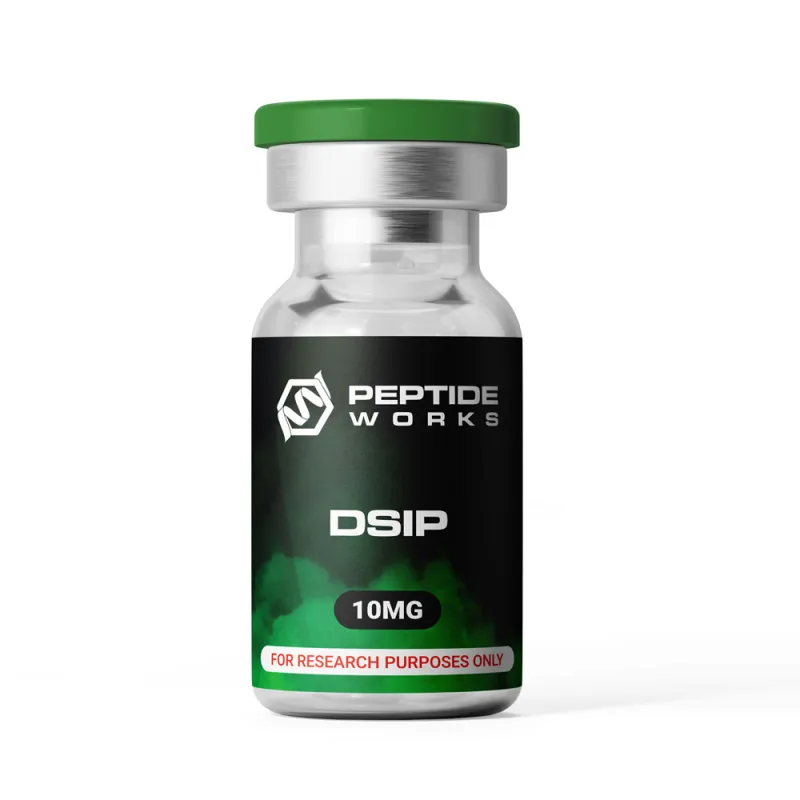
PROMO!
First order? Get 10% OFF with this code: 1storder
Written by

Stress affects millions of people every day around the world. Scientists are investigating DSIP peptide’s ability to lower stress hormones, and early studies suggest it works surprisingly well.
Laboratory studies reveal better mood and calmer behavior after DSIP Peptide administration. Multiple research teams test this compound worldwide.
Studies suggest DSIP may help regulate cortisol levels during stress testing. These findings help scientists understand stress mechanisms better.
Research continues exploring DSIP’s potential stress-reducing properties in controlled environments. Understanding cortisol regulation provides the foundation for DSIP’s stress-reducing effects.
Explore DSIP Peptide from Peptide Works, a sleep-promoting peptide studied for its ability to reduce stress hormones and support calm brain function.

DSIP peptide works by blocking stress signals in the brain during research studies. Scientists find this peptide stops ACTH hormone release from the pituitary gland.
Research shows DSIP reduces ACTH release, which may influence cortisol regulation in laboratory models. The peptide targets specific brain receptors that control stress responses.
Studies observe measurable neuroendocrine effects within hours of administration in research settings. This mechanism helps researchers understand how peptides control stress hormones.
Peptide Works provides research-grade DSIP for scientists studying cortisol regulation worldwide.
DSIP peptide binds to GABA receptors in the brain during research studies. Scientists find this peptide also works with serotonin receptors that control mood.
Research shows DSIP affects dopamine pathways linked to stress responses. Studies reveal the peptide targets sleep-wake cycle receptors in laboratory tests.
These receptor interactions help explain how DSIP reduces stress hormones. Researchers study these brain pathways to understand peptide mechanisms better.
Sleep-wake cycle receptor targeting reveals why DSIP affects both stress and sleep quality.
Research shows DSIP peptide significantly reduces sleep latency in laboratory studies. Scientists find this peptide increases slow-wave sleep and deep-sleep stages significantly.
Some studies note changes in circadian rhythm markers after repeated DSIP administration. Laboratory data shows the peptide promotes delta-wave activity during sleep cycles.
Research demonstrates DSIP may help regulate disrupted sleep patterns in certain laboratory models. Epithalon peptide also supports circadian rhythm regulation through melatonin production pathways.
These restorative effects on sleep and circadian balance are also linked with improved cellular repair and longevity processes, topics explored further in our article on the best longevity peptides.
These sleep-cycle improvements help researchers understand peptide-based sleep-regulation mechanisms.
Delta waves are very slow brain rhythms that appear during deep sleep and support memory repair. Laboratory studies show DSIP peptide boosts delta-wave power during sleep cycles in research settings.
Research reveals stronger delta waves help reduce stress hormones the next day. Scientists find delta-wave sleep improves mood and lowers anxiety in test subjects.
Epithalon peptide also supports deep sleep by increasing melatonin production naturally. Both peptides work through different pathways to enhance restorative sleep quality.
Explore Epithalon Peptide from Peptide Works, a research peptide known for supporting melatonin production and improving circadian rhythm balance.
Melatonin, produced by the pineal gland, is a hormone that signals the body to prepare for sleep.
Research shows higher melatonin at night lowers late-evening cortisol, giving calmer moods and smaller stress spikes during lab tests.
DSIP studies suggest the peptide supports healthy melatonin release, helping circadian-rhythm balance and shortening stress-recovery times in rats.
Epithalon also boosts pineal function, giving longer melatonin pulses and deeper sleep, which scientists link with stronger morning stress resilience.
Body-clock balance means your sleep timing follows day and night patterns correctly. Research shows DSIP peptide fixes this timing in lab tests by stopping stress-hormone jumps.
Studies find that good sleep timing helps heart-beat patterns and helps fight stress better. Scientists are testing these sleep peptide methods to help improve sleep and calm moods.
Stress-hormone jumps happen when the body gets scared or worried quickly. Research shows DSIP peptide blocks stress hormones from going too high in lab tests.
Studies find this peptide suppresses ACTH release for several hours after use. Scientists see lower stress levels and calmer behavior in test subjects.
DSIP works by telling the brain to make fewer stress chemicals. This helps subjects think more clearly during challenging periods.

Laboratory studies show DSIP peptide suppresses ACTH release and maintains reduced levels for several hours after administration.
Researchers note the suppression effects decrease gradually, returning ACTH secretion toward baseline values as time passes in models.
This timed suppression helps limit acute cortisol spikes, lowering blood-pressure surges and easing anxiety markers in controlled animal models.
The defined duration offers researchers a clear window to study stress pathways without confounding hormonal rebounds or secondary endocrine reactions.
These timing mechanisms position DSIP for expanded stress-management applications in future scientific investigations.
DSIP peptide shows strong promise for stress studies in laboratory settings. Scientists continue studying how this peptide blocks stress hormones and improves sleep cycles.
Future work may explore DSIP timing effects and brain-receptor interactions more deeply. Studies suggest combining DSIP with other peptides could offer new scientific paths.
Laboratory data support continued investigation into stress-hormone regulation mechanisms. Scientists expect more clinical trials examining DSIP’s cortisol-blocking effects within controlled environments.
These findings help advance stress science and sleep study understanding. All DSIP applications remain strictly for scientific purposes only in laboratory settings.
All products discussed are supplied for research purposes only and are not intended for human use.
[1] Schneiderman N, Ironson G, Siegel SD. Stress and health: psychological, behavioral, and biological determinants. Annu Rev Clin Psychol. 2005;1:607-28.
[2] Yaribeygi H, Panahi Y, Sahraei H, Johnston TP, Sahebkar A. The impact of stress on body function: A review. EXCLI J. 2017 Jul 21;16:1057-1072.
[3] Tukhovskaya EA, Shaykhutdinova ER, Ismailova AM, Slashcheva GA, Prudchenko IA, Mikhaleva II, Khokhlova ON, Murashev AN, Ivanov VT. DSIP-Like KND Peptide Reduces Brain Infarction in C57Bl/6 and Reduces Myocardial Infarction in SD Rats When Administered during Reperfusion. Biomedicines. 2021 Apr 9;9(4):407.
[4] Shustanova TA, Bondarenko TI, Milyutina NP, Mikhaleva II. Regulation of free radical processes by delta-sleep inducing peptide in rat tissues under cold stress. Biochemistry (Mosc). 2001 Jun;66(6):632-9.
ALL CONTENT AND PRODUCT INFORMATION AVAILABLE ON THIS WEBSITE IS FOR EDUCATIONAL PURPOSES ONLY.
DISCLAIMER: These products are intended solely as a research chemical only. This classification allows for their use only for research development and laboratory studies. The information available on our Peptide Works website: https://peptide-works.com/ is provided for educational purposes only. These products are not for human or animal use or consumption in any manner. Handling of these products should be limited to suitably qualified professionals. They are not to be classified as a drug, food, cosmetic, or medicinal product and must not be mislabelled or used as such.
Peptide Works
Related Articles

Cartalax Benefits for Aging: Supporting Joint and Tissue Health Naturally
Aging affects how joints move and how tissues handle daily stress. Over time, movement may feel less smooth, and tissues

Can VIP Peptide help with Gastrointestinal Motility?
Research on gastrointestinal motility has gained attention because it plays a central role in digestion and overall gut function. When

Fighting Fungal Infections with TA1 Peptide
Fungal infections can be stubborn, often resisting common treatments and weakening the body’s defenses. In recent years, researchers have been